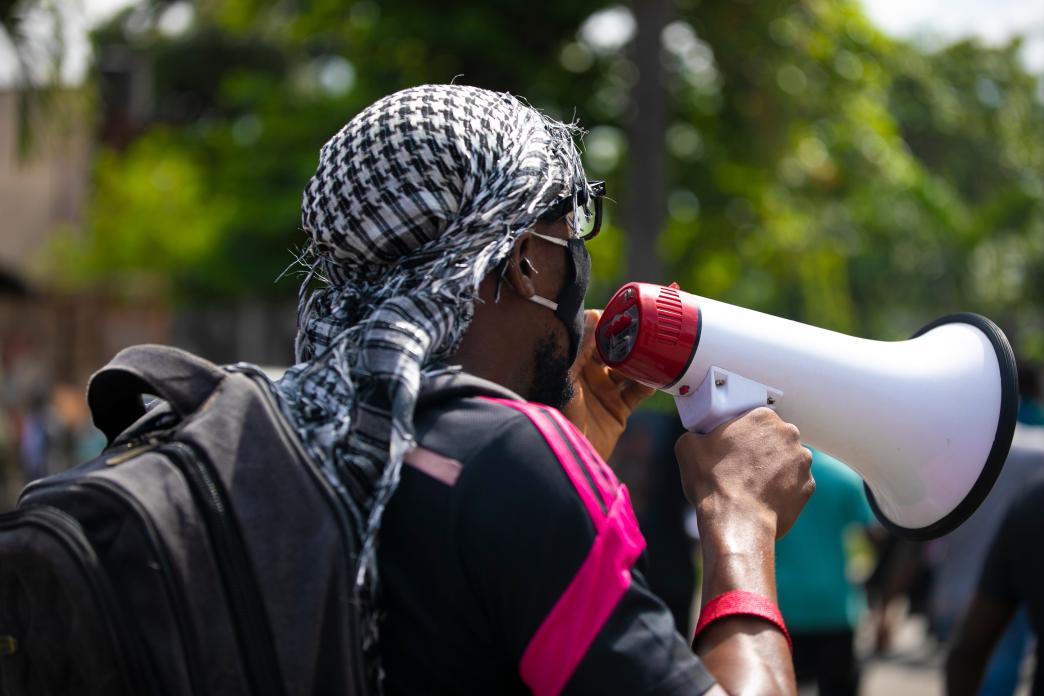
A Call to Action: Advancing Civic Space in the Extractive Sector
At the Natural Resource Governance Institute (NRGI) we have found that governments that support and protect civic space generally exhibit stronger natural resource governance. Yet in recent years governments in many resource-rich countries have shrunk civic space by increasing restrictions on freedoms of expression, association or assembly, and on the right to public participation—all of which are crucial prerequisites for citizen agency and government accountability.
Shrinking civic space in resource-rich countries
In countries where the call for transition to clean energy threatens interests vested in the fossil fuel sector, civil society is coming under increasing threat. The challenges faced by Ghanaian organizations questioning the Aker Energy deal is one example.
Efforts to strengthen and defend civic space have been central to the NRGI’s work since its founding. At the global level, we help to design and implement civic space safeguards through multi-stakeholder initiatives like the Extractive Industries Transparency Initiative (EITI) and the Open Government Partnership (OGP). In meetings of the EITI international board, NRGI fought for the adoption and implementation of the EITI Civil Society Protocol. Yet too often governments and companies balk at enforcing these protocols when it comes to calling out specific countries—as happened recently in the Philippines.
But translating pledges into action remains a challenge. Although the government of Niger rejoined EITI in February 2020, just weeks later civil society actors again accused authorities of harassing and arresting activists. The authorities justified their actions citing pandemic restrictions.
In Nigeria, NRGI is working closely with our partners to help citizens confront challenges in civic space. Authorities’ repression of freedom of speech and association in recent years complicates the accountability processes fundamental to strong resource governance. It also compromises citizens’ ability to engage in needed dialogue about the country’s preparation for the energy transition. Police crackdowns on protest and social media shutdowns during the pandemic meant that citizens were largely in the dark as government oil revenues declined. Late last year one of the most vocal civil society organizations, CISLAC, endured unwarranted harassment. Frontline reformists and advocates feel threatened with the marked fall of Nigeria’s performance in the World Press Freedom Index. Combined with the closure of internationally supported programs providing funding and technical support to oil-sector reform, this shrinkage in civic space risks foreclosing public dialogue on Nigeria’s economic future—which is more essential now as the energy transition gains momentum.
Charting a path forward
NRGI and our partners are reconceptualizing our work to advance resource governance in increasingly constrained and politically hostile environments. Together with Publish What You Pay (PWYP), Oxfam America, the International Center for Not-for-Profit Law and the Institute for Development Studies, we recently explored how we might adapt our objectives and approaches, brainstormed new strategies for protecting civic space, and examined the challenges associated with a just energy transition.
Building on these discussions and lessons learned, NRGI seeks to evolve its work to advance civic space and resource governance efforts in the following ways:
- Build more effective and diverse coalitions. Internal conflicts are hampering many existing coalitions. Resolving them, although no easy task, would make them more effective and less vulnerable to government backlash. In NRGI priority countries, we will work with PWYP and others to invest in dispute resolution, replicate models of successful coalitions, and encourage the diversification of coalition membership. Critical to this work will be more effective analysis of political economy, as we have undertaken in Nigeria, to identify the points of influence and actors to leverage amid closing civic space. We will also support and equip our partners to engage in and contribute to national debates on emerging topics related to just transition.
- Connect actors across country, regional and international dialogues. Authoritarian regimes are replicating their playbook across countries. We will in turn seek to connect advocacy across countries, for greater collaboration and impact, specifically to strengthen negotiation opportunities for lower-income countries in the context of the energy transition. One immediate task is to define and effectively advance a just transition agenda for resource-rich countries, and ensure that national agendas influence global climate action. We will engage more in relevant international forums like climate COPs, working with global partners and facilitating participation from civil society organizations of resource-producing countries.
- Support the translation of policy into effective practice. Where strong policies exist to protect civic space, we will use our influence and that of our partners to ensure strong implementation. For example, we will use our role on the EITI international board to push for a stronger implementation of the civic space protocol. We will also support the establishment of the OGP Civic Space Learning Network.
- Call out kleptocratic regimes and practices that enable them. We will leverage the global attention on Russia to call out the risks of seeking fossil fuels from other autocratic regimes. We will support calls for divestment to result in economic opportunities for democratic and reform-minded states. In parallel, we will advocate strengthening safeguards to ensure that economic opportunities related to critical minerals for the energy transition do not reinforce autocratic regimes.
To support these efforts, we call on a range of actors to take action:
- Bilateral and philanthropic foundation funders should strengthen long-term plans to support capacity development and coalition-building efforts, seeking to reinforce existing mechanisms for dialogue and participation—not creating new competing platforms.
- Multi-stakeholder initiatives like EITI and OGP should commit to more efficiently translating their standards into implementation; and to enforcing the standards they set—even in tough cases.
- Extractive sector and energy companies should speak up and support the protection of civic space, which is key to positive economic outcomes.
- Investors should strengthen criteria related to civic space protection in their business decisions, and encourage companies and governments to ensure the protection of civic space as essential to environmental, social and governance (ESG) considerations and a positive investment climate.
- International financial institutions should make greater use of their lending power to call for action to support civic space.
Civic space remains the cornerstone of resource governance and essential to the pursuit of more sustainable and equitable societies. Together with our partners, NRGI is committed to making the necessary pivots to respond to evolving civic space challenges.
Suneeta Kaimal is the president and CEO of the Natural Resource Governance Institute (NRGI). Matthieu Salomon is a senior governance officer at NRGI. Tengi George-Ikoli is a senior officer at NRGI.
Top image by Teo-Inspiro International for Shutterstock; midddle image by Delali Adogla-Bessa for Shutterstock; bottom image by Emmage for Shutterstock.
Authors

Suneeta Kaimal
President and Chief Executive Officer

Tengi George-Ikoli
Senior Officer

Matthieu Salomon
Acting Governance Programs Director | Lead, Anticorruption


